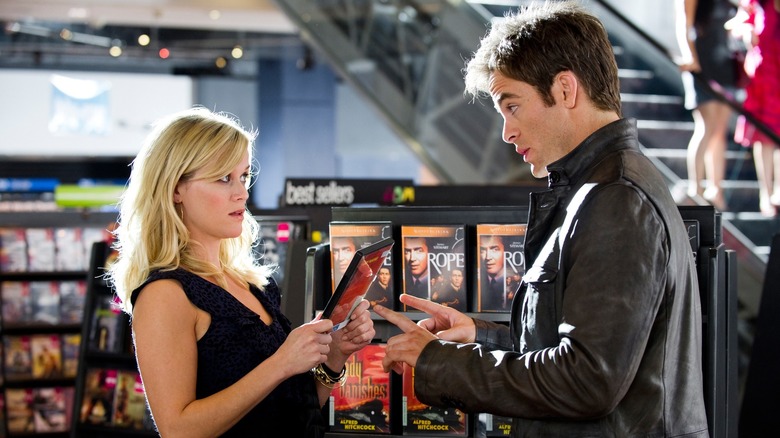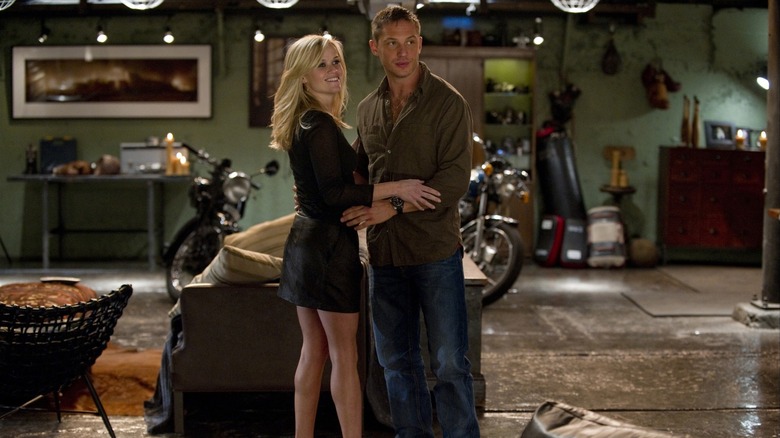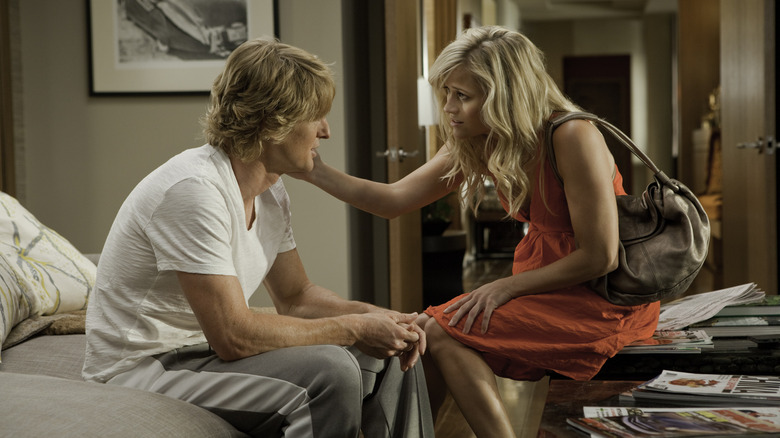Reese Witherspoon Has An Interesting Theory About The Decline Of The Rom-Com
Romantic comedies have been big business for as long as humans have been performing. If you want to stretch the definition of the term, one could argue that the raunchy satyr plays of Ancient Greece count as the earliest rom-coms. Typically, though, the term "romantic comedy" refers to a very specific film genre in which two characters spend the movie courting one another — or perhaps loathing each other — all while drifting ever closer to the instigation of a relationship.
The genre has risen and fallen over the years, depending on audiences' tastes, with a notable rise in rom-coms coming in the late 1980s. This explosion of the genre was likely inspired by the success of Rob Reiner's "When Harry Met Sally..." in 1989, and Garry Marshall's "Pretty Woman" in 1990. As studios rushed to emulate their success, the 1990s and 2000s saw the release of frothy, exciting rom-coms like "Sleepless in Seattle," "My Best Friend's Wedding," "Four Weddings and a Funeral," "Runaway Bride," "You've Got Mail," and so on.
Something happened in the 2010s, though. There were, of course, still hit rom-coms released during that period ("Crazy Rich Asians," anyone?), but the genre as a whole appeared to undergo a contraction. Far fewer high-profile rom-coms are now being made than in their 1990s heyday.
Reese Witherspoon, who's had a textured and varied career, also starred in several notable rom-coms in the 2000s and 2010s, including "Sweet Home Alabama," "Just Like Heaven," "How Do You Know," and "This Means War." Witherspoon, from that position, commented on the modern state of rom-coms in an episode of the "Armchair Expert" podcast (handily transcribed by People Magazine), and she theorized that the genre has become less and less popular in direct conjunction with alterations in modern dating habits.
Reese Witherspoon thinks people don't date the way they used to
Witherspoon became wistful on the podcast as she talked to host Dax Shepherd. She recalled a certain kind of socialization that required people approaching one another in person and striking up conversations in a public place. Such interactions, she seemed to feel, required establishing a rapport and in-person chemistry. She doesn't say it, but Witherspoon appeared to be lamenting the rise of app-based communication in the dating world, even though it's certainly the reigning standard. She also felt that the decrease of romantic comedies in theaters has robbed people of the ability to learn a certain kind of romantic vocabulary. In her own words:
"Something's wrong. [...] I have a theory about it. [...] It all has to do with rom-coms and sitcoms. You know how there's been, like, the past 10 years — I would even say the past 15 years — this decline in the making of rom-coms? Or, like, legitimate big movie stars being in rom-coms? [...] It's not just rom-com movies, but I also think of rom-com television shows. The television show that you watched when you were 11, 12, or 13, that made you imagine and visualize dating skills."
Witherspoon went on to indicate that without those constant positive depictions of love and romance on the big screen, young people may not learn some of the basic behaviors one must engage in to become coupled. Of course, many essays could be written about the shifting of sexual values and gender politics over time, as well as the rise in anxiety, and how these things contribute to an ever-changing romantic dynamic among young people.
Witherspoon, though, implied that all the above stymies people from, y'know, just asking out other people.
Witherspoon's challenge
Indeed, Witherspoon feels that a lot of free-floating romantic angst can be solved with a few resolute personal actions. She turned to the co-host of the "Armchair Expert" podcast, Monica Padman (who is single), and issued an ultimatum: Ask out a few people and report back immediately. As she put it:
"Well, I'm gonna give you a job. [...] In the next three months, I want you to ask out three different people ... And I'm gonna give you my phone number, and you're gonna text me each time you do it. [You say the following:] 'Okay, I know this is a little forward. I've never done this before. I just noticed that you might be single, but I have noticed you a couple of times. And would you ever wanna just get coffee with me?'"
To Witherspoon, the solution is simple: Ask the people you find attractive on a date. One would certainly be encouraged if a major Hollywood star was at your back, waiting to hear your stories.
No romance is exactly the same as another, of course, and no relationship is going to resemble the relationship of the people next to them. Thus, not all rom-coms will be a universal fit. Indeed, LGBTQ+/queer rom-coms weren't part of the Hollywood gestalt until relatively recently (major studios didn't really make them until at least the 1980s or 1990s), and watching TV rom-coms might not always be relatable. But Witherspoon, overall, appears to be encouraging people to be a little bolder in their approaches to romance and sex. And encouraging confidence is no bad thing.


